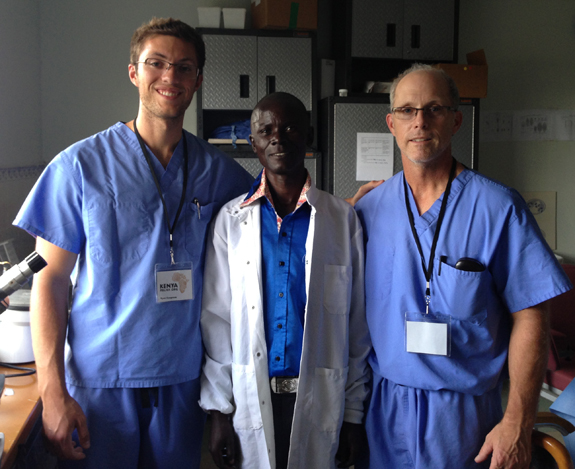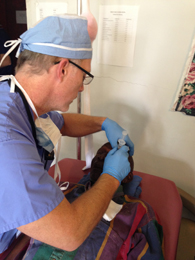Michael Cosgrove, CRNA, administrator at Eye Surgery Center of Michigan in Troy, Michigan, travels to Migori, Kenya, with Kenya Relief every year to provide eye surgery to local villagers. As a nurse anesthetist, Cosgrove performs ocular blocks for the surgeries.

From right, Michael Cosgrove, CRNA, administrator at Eye Surgery Center of Michigan in Troy, Michigan, Kenya Relief Lab Director Benjamin and Cosgrove’s son, Ryan, at the Kenya Relief surgery center in Migori, Kenya. Cosgrove and his son were in Migori in August 2013.
Kenya Relief performs 20 mission trips annually to Migori and has established an ASC in the village, Cosgrove says. “Steve James, CRNA, is the founder of this great organization and is working to construct a hospital in Migori.”
James’ daughter died while in college and she was supporting a child in Migori, Cosgrove says. “James went to Migori after his daughter’s death and saw how underserved the area was. So he created an orphanage in memory of his daughter, an ASC, a school and is now working with large hospitals in the metro Detroit area to raise funds for the hospital project.”
Cosgrove’s ASC donates medications and supplies to the missions and also works to solicit funding for Kenya Relief.
Two of the 20 Kenya Relief missions are ophthalmic and Cosgrove brought his son, a pre-med student, with him last year. This year, Marilynn Sultana, MD, an ophthalmologist at his ASC, will accompany him.

Michael Cosgrove, CRNA, administrator at Eye Surgery Center of Michigan in Troy, Michigan, performs a peri-ocular block for a patient prior to cataract surgery in Migori, Kenya.
“The medical mission runs for three days but we travel for 10 days,” Cosgrove says. “We fly to Nairobi and then drive for nine hours to Migori. It’s a small, poor village, and blindness is extremely common related to prevalence of cataract there. Last year, we did 170 surgeries.”
The people in Migori are extremely grateful for the care they receive, he says. “They are friendly and optimistic and yet they have nothing. They are just very appreciative to have any sort of health care because it does not exist in their lives.”